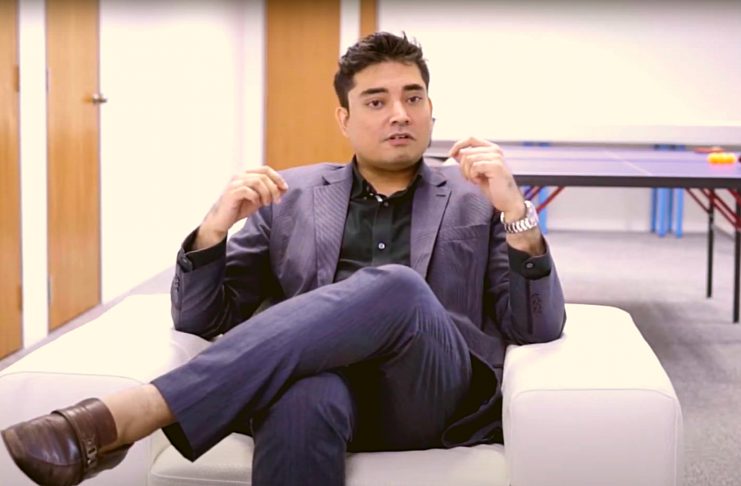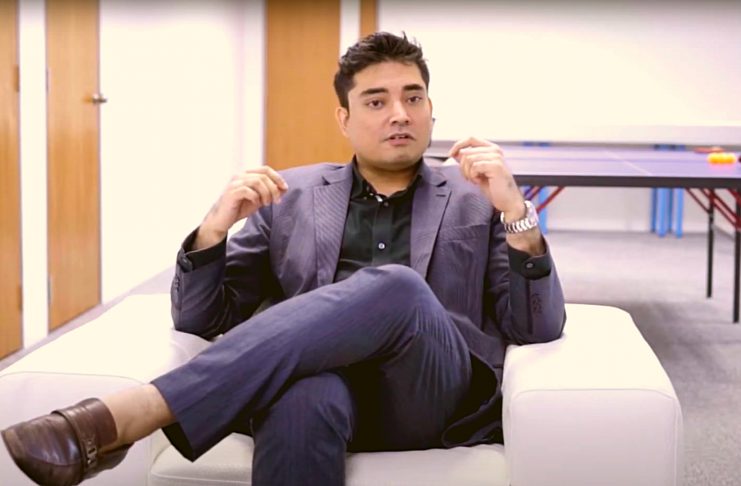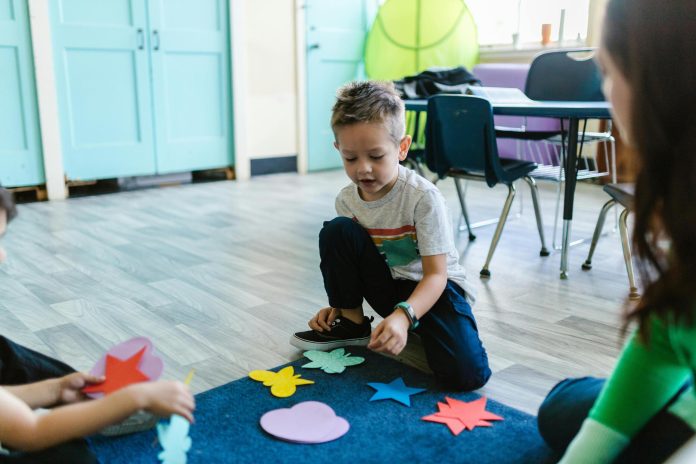How Umonics Method CEO Sancy Suraj is Empowering Kids with Lifelong Memory Skills.
Sancy Suraj is the CEO and founder of Umonics Method, a program that focuses on empowering children with lifelong memory skills. Suraj has spent over a decade studying and researching the human brain, memory and learning, and has developed a unique methodology to help children enhance their memory, concentration, and confidence. In this article, we will explore the Umonics Method and how it differs from traditional methods of teaching and memory training, as well as how it has helped many children overcome learning difficulties and excel in their studies.
Can you tell us more about the Umonics Method and how it empowers children with lifelong memory skills?

Absolutely. The Umonics Method is a memory enrichment training program designed specifically for preschoolers between the ages of 3-6. Our program is focused on teaching young children the skills they need to develop strong memory techniques that they can use for the rest of their lives. Our approach is holistic, meaning we focus on developing all aspects of a child’s memory, including auditory, visual, and kinesthetic memory.
At Umonics, we believe that memory is a critical skill to develop at a young age. Without the ability to retain information effectively, knowledge cannot be retained. We aim to teach preschoolers how to memorize and recall information with ease, giving them a strong foundation in memory techniques that will benefit them throughout their academic and personal lives. We believe that memory training should be taught to preschoolers at a young age, just like how we teach them to read and write.
Our program is founded on the principles of memory athletes, like myself, who have used these techniques to achieve world records in memorization. We teach children how to use techniques like visualization, association, and repetition to remember information quickly and easily. By using these techniques, children can learn to remember information faster, better, and with more accuracy.
Ultimately, the Umonics Method is about empowering children with the skills they need to succeed in academic and personal life. By teaching children how to develop their memory, we are helping them to build strong foundations for lifelong learning. Our program is designed to help children build confidence, overcome fear of exams, and ultimately achieve their full potential. We believe that every child deserves the opportunity to learn these critical skills, and we are proud to offer our program to parents and schools in Singapore.
What inspired you to create the Umonics Method and what are some of the challenges you faced along the way?
As a memory athlete and corporate trainer, I have always been fascinated by the potential of the human mind and its incredible capacity for memory. I firmly believe that memory is a skill that can be developed, and that teaching children these skills at an early age can have a profound impact on their future success in life. This is what inspired me to create the Umonics Method.
The Umonics Method is a memory enrichment training program for preschoolers that teaches children how to memorize and recall information with ease. It is designed to maximize individual potential by creating strong foundations in memory techniques for lifelong learning. My goal was to create a program that would empower young children with the tools and techniques they need to excel academically and beyond.
One of the biggest challenges I faced in developing the Umonics Method was finding the right approach to teaching memory skills to preschoolers. I had to design a program that was engaging, fun, and age-appropriate, while still being effective in developing memory skills. I also had to ensure that the program was easy for teachers and parents to implement, so that it could be widely adopted and make a real impact.
Another challenge was in overcoming the prevailing mindset that memory skills are simply innate abilities that cannot be taught. Many people believe that memory is something you either have or you don’t, and that it cannot be developed through training. However, my experience as a memory athlete and corporate trainer has shown me that memory skills can be taught and developed through the right training and techniques. Convincing others of this fact was a challenge, but one that I was determined to overcome.
Despite these challenges, I am proud of what we have accomplished with the Umonics Method. We have created a program that has helped countless preschoolers in Singapore develop strong memory skills and set the stage for lifelong learning and success.
How does the Umonics Method differ from traditional methods of teaching and memory training?
The Umonics Method differs from traditional methods of teaching and memory training in several ways. Firstly, the Umonics Method is specifically designed for young children between the ages of 3-6 years, whereas traditional methods of memory training are typically aimed at adults or older children. The Umonics Method takes into account the developmental stages of young children and tailors its approach accordingly. This ensures that the children are not overwhelmed with information and can learn in a fun and engaging way.
Secondly, the Umonics Method focuses on the holistic development of memory skills, rather than simply rote memorization. The method aims to improve the children’s memory capacity by teaching them a variety of memory techniques, such as association and visualization, that can be applied to different types of information. This approach ensures that the children not only remember what they have learned but also understand the information and can apply it in different contexts.
Thirdly, the Umonics Method is based on a play-based learning approach. The method uses games, puzzles, and other interactive activities to engage the children and make learning fun. This approach not only enhances the children’s motivation to learn but also helps them develop other important skills, such as problem-solving, creativity, and critical thinking.
Finally, the Umonics Method emphasizes the importance of regular practice and reinforcement of the memory skills learned. The method provides parents with tools and resources to support their children’s memory development at home, such as memory games, flashcards, and online resources. This ensures that the children’s memory skills continue to develop and improve over time, rather than being a one-off exercise.
In summary, the Umonics Method differs from traditional methods of teaching and memory training by focusing on young children’s holistic memory development, using a play-based learning approach, and providing parents with tools and resources to support their children’s learning. The method is designed to be engaging, fun, and effective, ensuring that children develop lifelong memory skills that will serve them well in all aspects of their lives.
“The Umonics Method revolutionizes memory training by catering to young children’s developmental stages, embracing a holistic approach to memory development, and making learning fun through play-based activities. With regular practice and parental support, this method helps children develop lifelong memory skills that go beyond rote memorization and empower them with knowledge that can be applied in different contexts.”
Can you share some success stories of children who have benefited from the Umonics Method?
Certainly, I am proud to say that we have seen numerous success stories from children who have benefitted from the Umonics Method. One such example is a student named Ethan, who joined our program at the age of four. Prior to joining, Ethan had difficulty remembering basic information and struggled to focus during classes. However, after just a few months of training with us, Ethan’s memory skills had improved significantly. He was able to memorize and recall long lists of words, numbers, and other information with ease. Additionally, his focus and concentration had also improved, allowing him to better engage in class activities. Today, Ethan is a top-performing student in his class, and his parents credit his success to the Umonics Method.
Another success story is about a girl named Chloe, who had previously been diagnosed with a learning disability. Chloe had difficulty retaining information and often struggled with her studies. However, after joining the Umonics Method, Chloe’s memory skills began to improve rapidly. She was able to remember new information with ease, and her overall academic performance improved significantly. Today, Chloe is a confident and motivated student who is excelling in her studies.
We have also had numerous success stories from parents who have noticed a marked improvement in their child’s memory skills and overall academic performance after joining our program. Many parents have reported that their children are able to retain information more effectively and are more confident in their ability to learn. Some parents have even reported that their child’s newfound memory skills have had a positive impact on their social skills and emotional well-being.
Overall, the Umonics Method has been incredibly effective in helping children develop lifelong memory skills. Our program has been designed to be fun and engaging, which helps children to stay motivated and interested in learning. We are proud of the success stories we have seen and are committed to continuing to empower children with the skills they need to succeed in life.
How do you see the Umonics Method evolving in the future and what new developments can we expect to see?
As the world evolves, the education system is constantly changing, and so is the way we teach our children. At The Umonics Method, we are committed to keeping up with the latest developments in the field of memory training and education. We constantly evaluate and evolve our program to ensure that we are providing our students with the most effective and efficient memory techniques possible.
In the future, we aim to expand our reach beyond Singapore and into other parts of the world. We believe that our method has the potential to benefit children globally, and we want to share our expertise and experience with as many children as possible. We will achieve this by continuing to refine and improve our program, while also collaborating with experts and educators around the world to develop new techniques and strategies for teaching memory skills to young children.
One of the new developments we are currently working on is the integration of technology into our program. We are exploring ways to use apps and other digital tools to enhance our memory training program, making it more engaging and interactive for young children. We believe that by integrating technology into our program, we can better engage and motivate our students, leading to even better outcomes and results.
Additionally, we are exploring ways to incorporate more hands-on and experiential learning into our program. We believe that young children learn best through play and exploration, and we want to create more opportunities for our students to engage with memory techniques in a fun and interactive way. We will achieve this by developing new games and activities that incorporate memory training into everyday play.
Overall, we see a bright future for the Umonics Method. As we continue to refine and evolve our program, we are confident that we will be able to help even more children around the world develop the memory skills they need to succeed in life.
“The Umonics Method is not just a memory training program, it’s a commitment to constantly evolve and adapt to the ever-changing landscape of education. By integrating technology and hands-on learning, we are paving the way for a brighter future where children worldwide can unlock their full potential through the power of memory.”
When asked about the inspiration behind the Umonics Method and the challenges faced, Suraj revealed that his own struggles with memory and learning difficulties led him to embark on this journey. Through extensive research and experimentation, he developed a methodology that is based on the latest neuroscience findings and incorporates techniques such as visualization, association, and creative thinking. The Umonics Method is designed to engage both the left and right hemispheres of the brain, thereby improving cognitive abilities and promoting long-term memory retention.
Suraj explained that the Umonics Method differs from traditional teaching methods in that it focuses on improving memory and cognitive abilities first, before delving into specific subjects. The program is tailored to the individual needs of each child and involves interactive games, puzzles, and exercises that are designed to stimulate the brain and enhance memory skills. Suraj also highlighted that the Umonics Method has been proven effective in helping children with learning difficulties such as dyslexia and ADHD, as well as gifted children who need to be challenged in their studies.
Suraj shared several success stories of children who have benefited from the Umonics Method, including a dyslexic child who went from failing grades to achieving top scores in his class, and a child with ADHD who improved his focus and concentration. Suraj also discussed the future of the Umonics Method, stating that he plans to expand the program to reach more children around the world and incorporate new developments in neuroscience research.
What advice would you give to parents who want to help their children develop better memory skills at home?

As a memory expert and the CEO of Umonics Method, Sancy Suraj has a wealth of knowledge when it comes to helping children develop better memory skills. One of the most important pieces of advice she gives to parents is to create a positive learning environment at home. Children learn best when they are engaged and excited about what they are learning, so it is important to make the learning process fun and interactive.
Suraj also recommends that parents teach their children specific memory techniques that can help them retain information more effectively. For example, the Umonics Method uses visual imagery and association techniques to help children remember information more easily. Parents can work with their children to come up with their own creative associations and images to help them remember important facts and figures.
Another important tip that Suraj recommends is to break information down into smaller chunks. This makes it easier for children to digest the information and remember it over the long term. Parents can help their children by creating study guides or flashcards that break information down into smaller, more manageable pieces.
Finally, Suraj emphasizes the importance of regular practice. Just like any other skill, memory skills require regular practice in order to improve. Parents can work with their children to set aside time each day for memory exercises and activities, and make sure to praise their children for their efforts and progress along the way. With dedication and a positive attitude, parents can help their children develop better memory skills and achieve academic success.
“Creating a positive learning environment at home, teaching specific memory techniques, breaking down information into manageable pieces, and regular practice are the key ingredients for a successful memory recipe. As parents, we can be the master chefs of our children’s memory development, guiding them towards academic success with patience, dedication, and a sprinkle of fun.”
In conclusion, Sancy Suraj and the Umonics Method are changing the way we approach memory training and learning. By focusing on improving cognitive abilities and memory retention, the Umonics Method empowers children with the tools they need to succeed in their academic and personal lives. Parents looking to help their children develop better memory skills at home can benefit from the Umonics Method’s techniques and strategies, which are designed to be fun, engaging, and effective. With Suraj’s commitment to research and development, we can expect to see even more advancements in the Umonics Method in the years to come.














